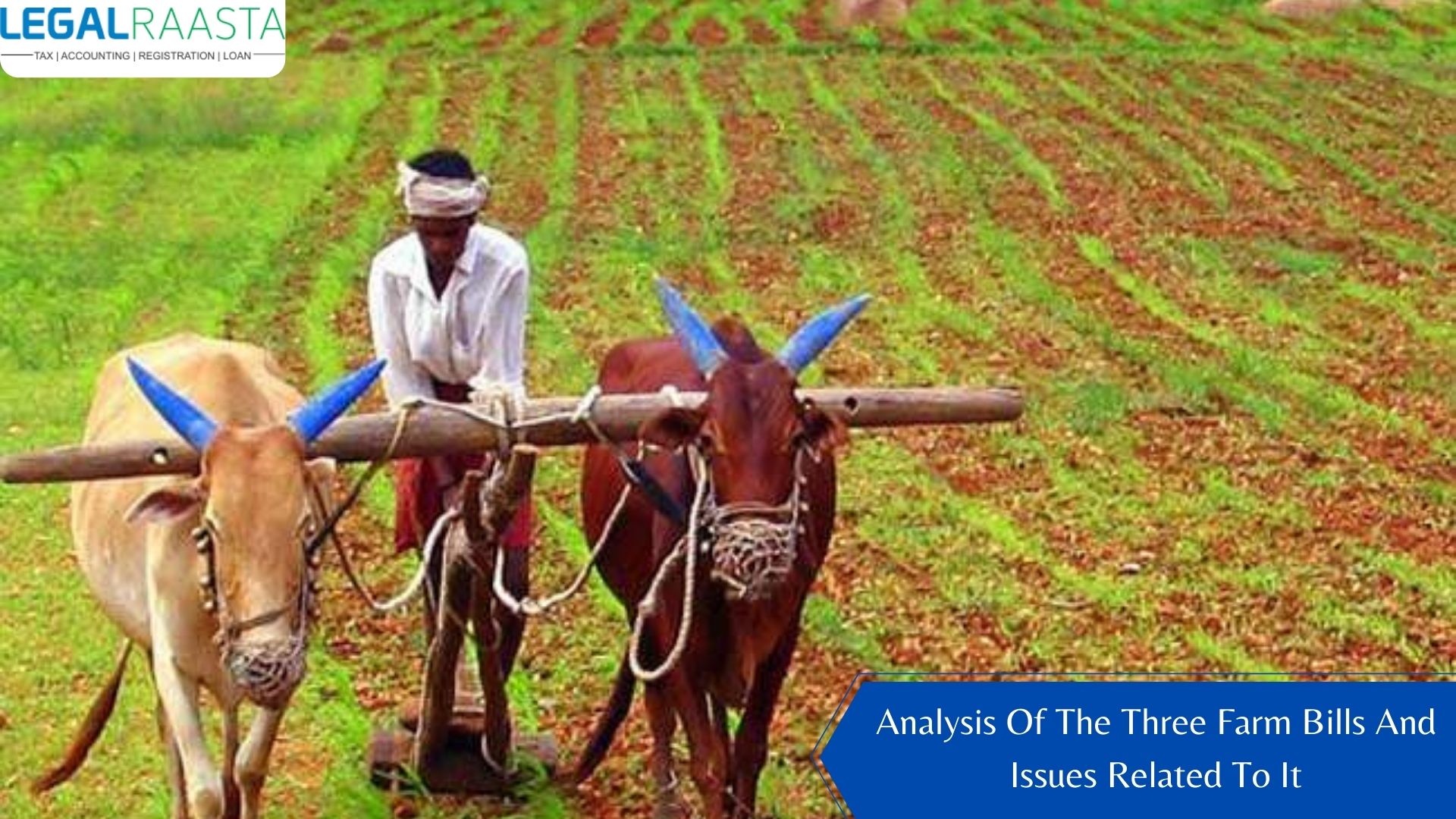During the monsoon session of the parliament, three farm bills were signed by the president and were then passed by the Indian parliament. The three farm bills are met by great resistance by the farmers as well as opposition. The three farm bills have led to huge protests by the framers’ organization all over India. These bills have been questioned on grounds of effectiveness and constitutionality. Congress MP, Prathapan TN, has also challenged the bills in the Supreme Court.
The three farm bills, which have now turned into acts are as follows:
Contents
- The three farm bills, which have now turned into acts are as follows:
- Analysis of the three farm bills
- 1.Farmers’ Produce Trade and Commerce (Promotion and Facilitation) Act, 2020
- Issues
- 2.Farmer’s (empowerment and protection) agreement of price insurance, farm services bill, 2020
- Issues
- 3.Essential commodities (amendment) bill, 2020
- Issues
- Agricultural produce market committee
- The legitimacy of the three farm bills
- Framer’s produce trade and commerce (promotion and facilitation) bill, 2020.
- Farmer’s (empowerment and protection) agreement of price insurance, farm services bill,2020
- Essential commodities (amendment) bill,2020
These three farm bills were passed to transform the depreciating state of Indian agriculture and also to attract private investors.
Analysis of the three farm bills
1.Farmers’ Produce Trade and Commerce (Promotion and Facilitation) Act, 2020
- This act is also known as APMC (agricultural produce marketing committee) bypass act. According to clause 14, this act has a superseding power over the unstable provisions of the state (APMC acts).
- According to clauses 3 and 4, farmers have the freedom to engage in intra-state or inter-state trade of their produce from those sources which are not limited to the physical markets created under various state Agricultural Produce Marketing Committee laws (APMC Acts).
- Clause 6 of the act restricts the collection of any market fees under the state APMC acts on the trader of farmers’ produce outside the APMC mandis.
- The act gives the central government the power to frame rules and regulations.
Issues
- According to the opposition, the above-mentioned benefits under the act would lead to corporation in agricultural sector. Because the act does not mention any fixed MSP, i.e. local farmers may not get adequate demand for their produce.
- Most farmers in India are own small land and do not have any means to transport their produce at far away distances. This will force them to sell their produce in the local market at prices which are far below MSP.
2.Farmer’s (empowerment and protection) agreement of price insurance, farm services bill, 2020
- This act creates a legal framework for contract farming in India. According to this act, farmers can enter into a direct agreement with a buyer to sell the produce at prearranged prices.
- Entities such as “Individuals, Companies, Firms, And Societies”, may participate in an agreement with the farmers to buy the latter’s farm produce.
- The farming agreement under the act covers mutually accepting terms between the farmers and sponsors. The agreement may include the supply of various farm resources, farm methods, and various quantities of produce.
- A three-tier dispute resolution system is also provided by this act. The dispute system consists of “The Conciliation Board (Parties of Agreement), The Sub Divisional Magistrate, And the Appellate Authority”.
Issues
- The most important trepidation regarding this act is the negotiating power of the concerned parties. Due to the poor negotiation ability of the farmers, rich sponsors or corporates may not give them fair prices for their farm produce.
- The farm industry may fall into the hands of exploiting capitalists. The latte may exploit the farmers for their private benefits, leading to suppression of an industry.
3.Essential commodities (amendment) bill, 2020
- According to this act, the power of the government shall be restricted for the production, supply, and distribution of certain import farm produce by removing or adding certain products such as “Cereals, Pulses, Potatoes, and Onions” from the list of vital commodities.
- The limit of stocks on farming produce will now be based on price which shall be rising in the market. This will be imposed depending on two conditions:
- If there is a 100% increase in the retail price of horticulture produce.
- If there is a 50% increase in the retail price of agricultural food items which are not perishable.
The price is to be calculated either for the preceding twelve months or the average retail price of the last five years, whichever is lower.
Issues
- To involve the private and public sectors or FDI, the changes in the regulation of stocks were introduced. If the stock limits remain within the installed capacity, chain participants won’t be valued due to stock limit application.
Agricultural produce market committee
To eliminate the exploitation of farmers by intermediaries, where the farmers are forced to sell their agricultural produce at a lower rate. An establishment was made by the marketing boards of the state government known as the Agricultural produce market committee. To ensure worthy prices and timely payment to the farmers, AMPCs initiated with physical markets where the production sale was done through auction.
The requirement of mandis in India is 42,000 mandis, but currently, only 7000 mandis exist. Also, a huge percentage of farmers in India belong to small scale farmers, who cannot afford to transport their produce to far off mandis. Hence, these farmers have no choice but to sell their produce to prate parties and still pay the mandi fee. Therefore, well-regulated mandis which will be initiated at a distance of 5 KM from each village will assure a better marketplace for farmers and save them from the dominance of private parties.
The act which is presently operating will only supersede the provision of existing AMPCs and will create parallel markets. This shall be done with different rules. To register with AMPCs, traders need to get a license and pay the required fees. This will also allow the government to obtain price intelligence. Furthermore, the state government will lose it’s power to regulate trade production with the entry of private sponsors. Hence, it will responsible for the mandi collision.
The acts do not formulate with the consent of the farmers. The act will fail to provide a minimum support price to the farmers.
The legitimacy of the three farm bills
According to the seventh schedule of the constitution, the power between the centre and the state government is distributed as per the three lists under the schedule. The parliament holds the power to authorize the subjects on the union list and the state alone can authorize the subjects in the state list. Whereas, the concurrent list has 47 subjects on both the state and central can authorize. However, in case of any conflict, the decision by the parliament prevails.
There are 8 entries with agricultural terms in the state list i.e. “Entry 14 (agricultural education and research, pests, plant diseases); 18 (rights in or over land, land tenures, rents, transfer agricultural land, agricultural loans, etc.); 28 (markets and fairs); 30 (agricultural indebtedness); 45 (land revenue, land records, etc.); 46 (taxes on agricultural income); 47 (succession of agricultural land); and 48 (estate duty in respect of agricultural land)”. However, no matters relating to agriculture are included in the union and current list.
Both the act, “Framer’s produce trade and commerce (promotion and facilitation) bill, 2020 and Farmer’s (empowerment and protection) agreement of price insurance, farm services bill,2020”, do not mention the constitutional provision under which parliament has the power to authorize on the subjects which are covered.
The “Doctrine of pith and substance” must be used to determine the legitimacy of the laws. Framer’s produce trade and commerce (promotion and facilitation) bill, 2020 is expected to be included in entry 28 of the state list (markets and fairs). Whereas, the Farmer’s (empowerment and protection) agreement of price insurance, farm services bill,2020 is expected to be included in entries 14, 18, and 46 of the state list.
We provide all kinds of legal services like “LLP registration, Trademark Registration , Private Limited Company Registration, Nidhi Company Registration”, and many more. So, contact the expert team of “LegalRaasta”, for a completely smooth and hassle free process.






